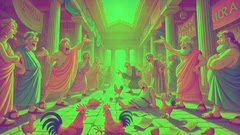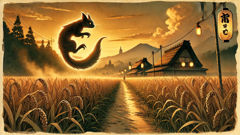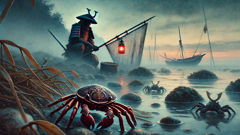Introduction
On the windswept coast of Thrace, where the Aegean gleams under a sun as old as myth, there once lay a town called Abdera—a place so infamous for its peculiar inhabitants that its very name became a byword for folly across the Hellenic world. Abdera’s whitewashed houses clustered along a lazy river, framed by fields of olive and barley, all watched over by statues of gods who seemed perpetually amused by their worshippers’ antics. The people of Abdera, though convinced of their own wisdom, were renowned for their love of endless debates and their talent for finding trouble where none existed. Outsiders often left shaking their heads, whispering about the Abderites’ penchant for complicated solutions to simple problems and their unshakable belief in the extraordinary importance of trivial matters. Yet, within the city’s sun-dappled streets and bustling agora, life thrummed with an energy uniquely its own—a blend of sincere intention, comic misunderstanding, and a stubborn refusal to ever admit error. The tale of the Abderites is not just a record of their blunders; it’s an affectionate lampooning of the human condition, for who among us has never argued passionately for the silliest cause, or chased a rumor with all the seriousness of a hero on a quest? In Abdera, each citizen seemed to embody the city’s contradictions: wisdom tangled with absurdity, pride with naivety, and a communal spirit that could spark both riotous feuds and the grandest festivals. As we wander through the alleys of this peculiar town, watching the Abderites bicker, blunder, and occasionally stumble upon sense, we are invited to laugh—not just at them, but with them, and perhaps even at ourselves.
The Council of the Wise: Where Sense Goes Astray
The heart of Abdera’s comic genius pulsed within its esteemed Council of the Wise, a body so dedicated to deep thought that meetings lasted longer than the city’s summer droughts. Once a week, under a tiled portico festooned with grapevines, the councilors assembled in togas of blinding white, each armed with a sheaf of arguments and a flask of local wine. The presiding magistrate—Philostratos the Impeccable, whose beard had not known a crumb in decades—would solemnly bang his staff and declare the session open. Thus began the weekly parade of opinions, each more convoluted than the last.
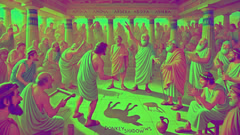
It was here that the infamous Debate on the Donkey’s Shadow erupted into legend. A visiting merchant had rented a donkey to carry his figs through Abdera’s winding lanes. At noon, he paused to rest in the patch of cool shadow cast by the animal. But the donkey’s owner protested, demanding payment for the use of the shadow as well as the beast. The council, never one to pass up a puzzle, convened a special session. All afternoon, councilors scribbled equations in dust, drew diagrams of donkey silhouettes, and quoted obscure philosophers. Should the shadow be billed separately? Was it a product of the donkey, the sun, or the ground? The townsfolk gathered in droves, wagering on the outcome as if it were the Olympic Games. At last, after hours of feverish debate, the council issued its ruling: the shadow belonged to no one and everyone, and thus could only be divided by consensus at sunrise—a time when, naturally, the shadow disappeared.
Their pursuit of logic frequently led them astray. When a citizen claimed that a plague of frogs was caused by wearing red sandals, the council launched an inquest. For days, pairs of councilors observed sandal-wearing citizens, noting frog appearances in elaborate ledgers. Their findings—confusing correlation with causation—resulted in a decree: red sandals would henceforth be restricted to festival days. The frogs, as indifferent as ever, kept croaking from the riverbanks, but the council’s sense of accomplishment could not be shaken.
Even the simplest affairs became labyrinthine. When the statue of Heracles lost its nose in a storm, the council debated whether the restoration should be in marble or bronze, each camp delivering passionate soliloquies on the merits of both. Months passed, and the statue’s faceless visage presided over the square, a mute testament to the Abderites’ ability to turn repair into epic.
If wisdom resided in Abdera, it must have taken a wrong turn somewhere along the city walls. Yet the councilors persisted, believing—like all true Abderites—that every problem held a solution if only you argued long enough, and that the greatest wisdom was, perhaps, never admitting defeat.
The Plague of Curiosity: When Mice Ruled Abdera
In Abdera, curiosity was less a virtue than an epidemic. The town’s population was struck one year by an invasion of mice, which crept into pantries, nibbled on parchments, and staged midnight parades through the council chamber. Panic swept the city. Housewives shrieked, philosophers wept for their chewed scrolls, and bakers found mysterious holes in every loaf. Abderites, never content with simple explanations, launched a full-scale investigation. Theories multiplied: Was it the new moon? Had the town offended Hermes? Was it the smell of councilor Lysimachus’s famed cheese pies?
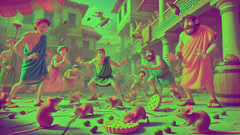
A commission was formed—'The Supreme Inquiry into Murine Affairs'—composed of scholars, chefs, and a very serious priest. Their sessions rivaled those of the council for length and absurdity. Lists were made of every cheese wheel in Abdera. Temples were scrubbed and garlanded anew. The town crier shouted daily updates: “Mice remain at large! Cheese suspected!”
It was young Melitta, a girl with a sharp eye and sharper wit, who first noticed the mice always avoided the olive jars. Her observation, relayed to her father and then to his cousin and then to half the town, sparked a fresh round of debate. Should olives be placed at every threshold? Was this divine guidance? By week’s end, every house in Abdera reeked of olives. The mice, unimpressed, moved on to honey cakes.
When the priest suggested a grand ritual to banish the rodents, the council embraced the idea. Citizens gathered at the main square, bearing torches and baskets of offerings. The ceremony reached its climax when, in a moment of dramatic improvisation, Lysimachus tripped and upended his cheese pies onto the ground. The mice swarmed, the townsfolk shrieked, and chaos reigned until the town’s dogs joined in the feast, chasing the invaders through the alleys.
The crisis was declared resolved by popular acclaim, and the event was immortalized with a mural—depicting not a victorious Abderite, but a mouse wearing a laurel crown atop a cheese pie. From then on, whenever trouble brewed in Abdera, someone would point to the mural and say, “Let’s ask the mice; they seem to know best.”
The Festival of Inventions: Genius or Nonsense?
The annual Festival of Inventions was Abdera’s proudest tradition. For one sun-soaked week, the city transformed into a theater of the absurd, as every citizen presented their latest contraption, each more impractical than the last. Booths lined the agora: there was the wind-powered egg peeler (which scattered yolks for blocks), the self-filling amphora (which never quite filled), and the notorious 'Silent Lyre,' designed by Euphranor to produce music only he could hear.
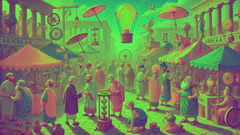
The highlight of the festival was always the Invention Parade, led by the councilors in outlandish hats. This year, Diodorus, a philosopher famed for his dazzling rhetoric and utter lack of common sense, introduced the Transparent Umbrella—a frame with no cloth—proclaiming it shielded its user from philosophical doubt if not from rain. The crowd applauded wildly, and several requested blueprints.
Amid the laughter, some Abderites took their inventions very seriously. Old Heraclea had spent months crafting the 'Catapulted Grapevine,' meant to plant vines quickly across the city. On festival day, she launched her device from the hilltop. The grapevine sailed, landed in the mayor’s hat, and became the festival’s official symbol for a decade.
Children devised games to test each contraption: whose egg could fly farthest from the peeler, who could hear a note from the Silent Lyre, who dared stand under the Transparent Umbrella during a sudden squall. The festival ended in a cacophony of applause, groans, and more than one bandaged thumb. Still, the Abderites believed their inventions made them the envy of all Greece.
Years later, visiting traders would recount tales of Abdera’s genius for nonsense. 'They invented a chair that collapses for easy carrying—but you can’t sit on it,' one would say. Another would add, 'They solved hunger by declaring that anyone feeling hungry should just close their eyes.' Invention in Abdera was less about utility and more about entertainment—and perhaps, deep down, a longing to prove that wit and whimsy were as important as wisdom.
Conclusion
In the annals of Greek history, the city of Abdera stands out not for its triumphs or tragedies, but for its unflagging commitment to comic confusion. The Abderites’ talent for turning sense on its head made their city a legend—an emblem of all that is delightfully human in our quest for meaning. Their blunders, memorialized in song and mural and festival, were not acts of malice but of earnestness gone awry. In mocking their foibles, we catch a gentle reflection of our own: the urge to overthink, to argue over trifles, to mistake cleverness for wisdom. Yet there’s also joy in their stubborn optimism, their belief that every problem deserves debate and every solution a celebration. For in Abdera’s laughter-filled streets, amid inventions that never worked and councils that never decided, lived a spirit undimmed by failure—a reminder that life’s greatest wisdom often blooms from folly, and that sometimes the best way to face the world’s absurdities is simply to laugh together.

